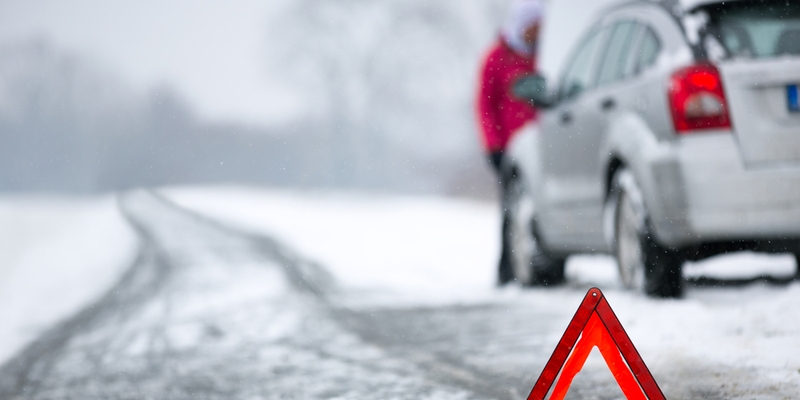
If you are not redirected within 30 seconds, please click here to continue.
Samedi: 10h – 16h HAE

If you are not redirected within 30 seconds, please click here to continue.
If you are not redirected within 30 seconds, please click here to continue.
Winter driving mistakes that could cost you

Like it or not, the Canadian winter is coming. And if you’re not prepared to drive through wet, slippery roads or through a snowstorm, you can end up in hot water.
Getting ready for winter driving keeps you and those around you safe. Moreover, taking a few safe driving precautions can save you money on certain fines or repair expenses. You’re also less likely to file an unexpected insurance claim down the line.
Here are some common winter driving mistakes that could cost you big and what you can do to avoid them.
Failing to install winter tires
Most Canadian provinces hit -10 degrees Celsius in the winter. If you think your all-season tires are good enough for winter driving in Canada, you may want to think again.
According to a recent survey by the Tire and Rubber Association of Canada (TRAC), one in three Canadians are less likely to install winter tires this year. And while it may be tempting to skimp on winter tires, particularly with the high cost of living, all-season tires just don’t provide the necessary grip and traction to handle snow, hail, or black ice.
Winter tires are more flexible and designed for the cold, slippery season with a deeper tread and a stronger grip so you can better control your car. If your personal safety is not reason enough to switch, remember, depending on the province you’re driving in, you’ll be fined if caught driving without winter tires.
In Quebec, you must switch to winter tires by December 1, otherwise you risk a fine of as much as $300 and two demerits on your licence. Winter tires are also mandatory on some highways in British Columbia. Those driving without proper winter tires on designated highways starting October 1, risk receiving a fine of $121.
Winter tires are recommended, but not mandatory in Ontario and Alberta.
Failing to keep up with winter car maintenance
While you’re getting your winter tires installed, it’s also a good idea to get your annual car maintenance. One thing you should pay close attention to, particularly during the winter, is making sure your tires are at their optimal pressure.
Your winter maintenance checklist should also include checking your windshield wipers, fluid, and oil. You may want to switch to synthetic oil for the winter as it handles temperature fluctuations better.
Just like winter tires, preventative maintenance may seem like an unnecessary expense during this time. But neglecting to rustproof your car, for instance, to save about $150 in the short-term will cost you more in the long run.
Rustproofing your car not only protects it from harsh winter elements, but if it worsens, the price tag for an extensive rust damage repair job can cost you anywhere from $600 up to $3,000.
Read more: Is rustproofing worth the added cost?
Failing to clear snow and defrost your car
When it snows, most people make the common mistake of only scraping off snow from their windshield. But for improved visibility and safety, it’s important to clear all your windows (not just the windshield) and roof. Lastly, make sure your licence plates are visible, too.
Another common mistake: Pouring hot water on your windshield to de-ice it. This can lead to small cracks that weaken your windshield glass. While it won’t immediately shatter, a small crack can turn into a larger one.
The cost of repairing a single windshield chip or crack ranges from $30 to $100, while a windshield replacement will cost you as much as $500. And remember, your insurance provider won’t always cover the repairs.
Depending on the province you live in, it’s illegal to drive with a cracked windshield. In Ontario, drivers caught with a cracked windshield will have to pay $110 as a fine. In Alberta, while there’s no specific law that prohibits it, you could still get a ticket for “unsafe driving,” setting you back by $100.
Failing to prepare for the unexpected
Safeguarding your vehicle and yourself in case of emergency is always a good idea, but especially if you’re driving through rural or remote areas. Imagine being stranded on the road in a remote location, waiting for help to arrive.
It goes without saying that you should be dressed for the weather, but it helps to keep an extra pair of gloves, a scarf, blanket, and socks stored in your emergency kit in your car if things ever take a bad turn. The Canadian Automobile Association (CAA) recommends stocking your car with some essential supplies like first-aid supplies, a small shovel or ice scraper, and jumper cables.
As the days get shorter, there’s also a higher chance of being stranded at night. Prepare for any expected situations by keeping a flashlight with extra batteries, as well as a portable battery charger.
Having to get your car towed because of a dead battery can cost you about $175 to $350.
Pack wisely: 12 essential items for your winter emergency home kit
Failing to adopt safe, winter driving habits
One big winter driving mistake is driving too fast given the conditions.
The posted speed limits are for ideal road conditions, not slippery streets. Slow down when there’s snow, reduced visibility, and icy roads. Don’t let your winter tires give you false confidence – you can still lose control and slide off the road despite their extra grip.
Many drivers forget they need more time to slow down and stop on winter roads, which makes tailgating an even bigger mistake. Keep a safe distance from the vehicle in front of you — following too closely gives you less time to react in case of a collision ahead.
Remember that no matter how cautiously you drive, there’s a higher-than-normal probability that you’ll skid on a winter road. If this happens, don’t panic.
Instead, lift your foot from the pedal and focus on where you want to go by steering that direction. To avoid skidding, you’ll want to tap your brakes lightly rather than slamming them. And, lastly, never speed up when skidding.
Bridges and overpasses are prone to black ice, so you should take extra caution when crossing them, which includes keeping a close eye on the cars ahead of you that may be sliding.
No one likes a reckless driver who compromises the safety of everyone on the road. In Ontario, the penalties for reckless driving include fines as high as $2,000, as many as six demerit points, suspension of your driver’s licence, and even jail time. And you’ll end up paying higher insurance rates.
Trust your gut: If it’s getting really gnarly out, just stay home
Lastly, ask yourself: Do you really need to be somewhere? If the weather is miserable, stay off the roads if you can. If there’s a blizzard moving in later in the week, move up your errands by a day.
By underestimating the weather and believing that you can beat the storm, there is a greater likelihood of ending up in a collision that could’ve easily been prevented.
Taking care of your vehicle ahead of winter and preparing for the worst keeps everyone safe, safeguards you against avoidable fees and fines, and reduces the odds of an insurance claim raising your premiums.
Don't waste time calling around for auto insurance
Use RATESDOTCA to shop around, and compare multiple quotes at the same time.
Get money-saving tips in your inbox.
Stay on top of personal finance tips from our money experts!










